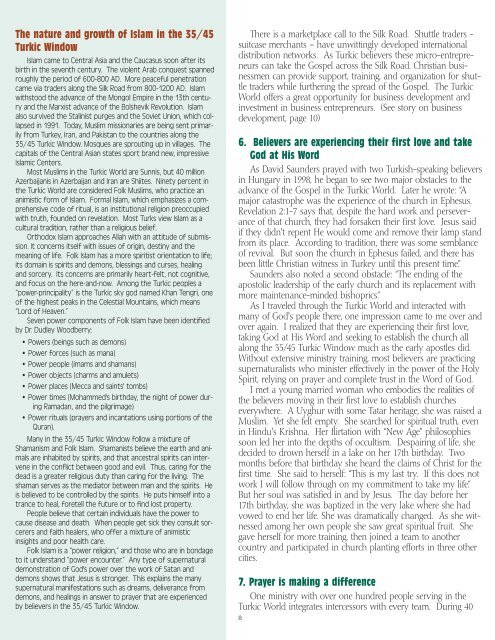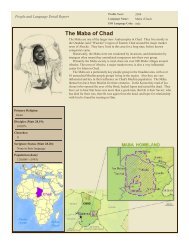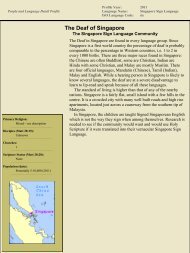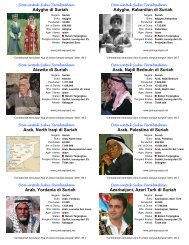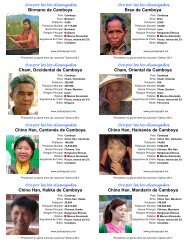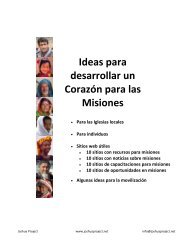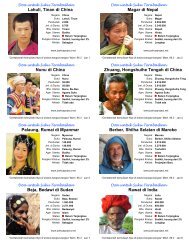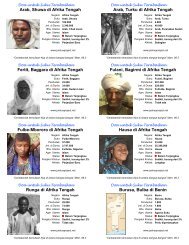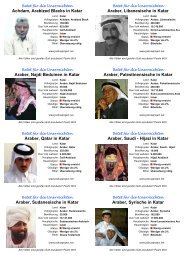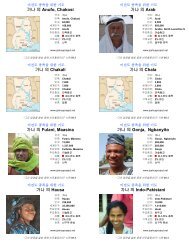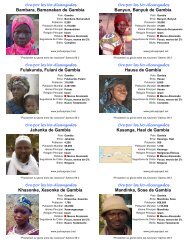AD2000 Turkic Window - Joshua Project
AD2000 Turkic Window - Joshua Project
AD2000 Turkic Window - Joshua Project
You also want an ePaper? Increase the reach of your titles
YUMPU automatically turns print PDFs into web optimized ePapers that Google loves.
The nature and growth of Islam in the 35/45<br />
<strong>Turkic</strong> <strong>Window</strong><br />
Islam came to Central Asia and the Caucasus soon after its<br />
birth in the seventh century. The violent Arab conquest spanned<br />
roughly the period of 600-800 AD. More peaceful penetration<br />
came via traders along the Silk Road from 800-1200 AD. Islam<br />
withstood the advance of the Mongol Empire in the 13th century<br />
and the Marxist advance of the Bolshevik Revolution. Islam<br />
also survived the Stalinist purges and the Soviet Union, which collapsed<br />
in 1991. Today, Muslim missionaries are being sent primarily<br />
from Turkey, Iran, and Pakistan to the countries along the<br />
35/45 <strong>Turkic</strong> <strong>Window</strong>. Mosques are sprouting up in villages. The<br />
capitals of the Central Asian states sport brand new, impressive<br />
Islamic Centers.<br />
Most Muslims in the <strong>Turkic</strong> World are Sunnis, but 40 million<br />
Azerbaijanis in Azerbaijan and Iran are Shiites. Ninety percent in<br />
the <strong>Turkic</strong> World are considered Folk Muslims, who practice an<br />
animistic form of Islam. Formal Islam, which emphasizes a comprehensive<br />
code of ritual, is an institutional religion preoccupied<br />
with truth, founded on revelation. Most Turks view Islam as a<br />
cultural tradition, rather than a religious belief.<br />
Orthodox Islam approaches Allah with an attitude of submission.<br />
It concerns itself with issues of origin, destiny and the<br />
meaning of life. Folk Islam has a more spiritist orientation to life;<br />
its domain is spirits and demons, blessings and curses, healing<br />
and sorcery. Its concerns are primarily heart-felt, not cognitive,<br />
and focus on the here-and-now. Among the <strong>Turkic</strong> peoples a<br />
“power-principality” is the <strong>Turkic</strong> sky god named Khan Tengri, one<br />
of the highest peaks in the Celestial Mountains, which means<br />
“Lord of Heaven.”<br />
Seven power components of Folk Islam have been identified<br />
by Dr. Dudley Woodberry:<br />
• Powers (beings such as demons)<br />
• Power forces (such as mana)<br />
• Power people (imams and shamans)<br />
• Power objects (charms and amulets)<br />
• Power places (Mecca and saints' tombs)<br />
• Power times (Mohammed's birthday, the night of power during<br />
Ramadan, and the pilgrimage)<br />
• Power rituals (prayers and incantations using portions of the<br />
Quran).<br />
Many in the 35/45 <strong>Turkic</strong> <strong>Window</strong> follow a mixture of<br />
Shamanism and Folk Islam. Shamanists believe the earth and animals<br />
are inhabited by spirits, and that ancestral spirits can intervene<br />
in the conflict between good and evil. Thus, caring for the<br />
dead is a greater religious duty than caring for the living. The<br />
shaman serves as the mediator between man and the spirits. He<br />
is believed to be controlled by the spirits. He puts himself into a<br />
trance to heal, foretell the future or to find lost property.<br />
People believe that certain individuals have the power to<br />
cause disease and death. When people get sick they consult sorcerers<br />
and faith healers, who offer a mixture of animistic<br />
insights and poor health care.<br />
Folk Islam is a “power religion,” and those who are in bondage<br />
to it understand “power encounter.” Any type of supernatural<br />
demonstration of God's power over the work of Satan and<br />
demons shows that Jesus is stronger. This explains the many<br />
supernatural manifestations such as dreams, deliverance from<br />
demons, and healings in answer to prayer that are experienced<br />
by believers in the 35/45 <strong>Turkic</strong> <strong>Window</strong>.<br />
There is a marketplace call to the Silk Road. Shuttle traders -<br />
suitcase merchants — have unwittingly developed international<br />
distribution networks. As <strong>Turkic</strong> believers these micro-entrepreneurs<br />
can take the Gospel across the Silk Road. Christian businessmen<br />
can provide support, training, and organization for shuttle<br />
traders while furthering the spread of the Gospel. The <strong>Turkic</strong><br />
World offers a great opportunity for business development and<br />
investment in business entrepreneurs. (See story on business<br />
development, page 10)<br />
6. Believers are experiencing their first love and take<br />
God at His Word<br />
As David Saunders prayed with two Turkish-speaking believers<br />
in Hungary in 1998, he began to see two major obstacles to the<br />
advance of the Gospel in the <strong>Turkic</strong> World. Later he wrote: “A<br />
major catastrophe was the experience of the church in Ephesus.<br />
Revelation 2:1-7 says that, despite the hard work and perseverance<br />
of that church, they had forsaken their first love. Jesus said<br />
if they didn't repent He would come and remove their lamp stand<br />
from its place. According to tradition, there was some semblance<br />
of revival. But soon the church in Ephesus failed, and there has<br />
been little Christian witness in Turkey until this present time.”<br />
Saunders also noted a second obstacle: “The ending of the<br />
apostolic leadership of the early church and its replacement with<br />
more maintenance-minded bishoprics.”<br />
As I traveled through the <strong>Turkic</strong> World and interacted with<br />
many of God's people there, one impression came to me over and<br />
over again. I realized that they are experiencing their first love,<br />
taking God at His Word and seeking to establish the church all<br />
along the 35/45 <strong>Turkic</strong> <strong>Window</strong> much as the early apostles did.<br />
Without extensive ministry training, most believers are practicing<br />
supernaturalists who minister effectively in the power of the Holy<br />
Spirit, relying on prayer and complete trust in the Word of God.<br />
I met a young married woman who embodies the realities of<br />
the believers moving in their first love to establish churches<br />
everywhere. A Uyghur with some Tatar heritage, she was raised a<br />
Muslim. Yet she felt empty. She searched for spiritual truth, even<br />
in Hindu's Krishna. Her flirtation with “New Age” philosophies<br />
soon led her into the depths of occultism. Despairing of life, she<br />
decided to drown herself in a lake on her 17th birthday. Two<br />
months before that birthday she heard the claims of Christ for the<br />
first time. She said to herself: “This is my last try. If this does not<br />
work I will follow through on my commitment to take my life.”<br />
But her soul was satisfied in and by Jesus. The day before her<br />
17th birthday, she was baptized in the very lake where she had<br />
vowed to end her life. She was dramatically changed. As she witnessed<br />
among her own people she saw great spiritual fruit. She<br />
gave herself for more training, then joined a team to another<br />
country and participated in church planting efforts in three other<br />
cities.<br />
7. Prayer is making a difference<br />
One ministry with over one hundred people serving in the<br />
<strong>Turkic</strong> World integrates intercessors with every team. During 40<br />
8


